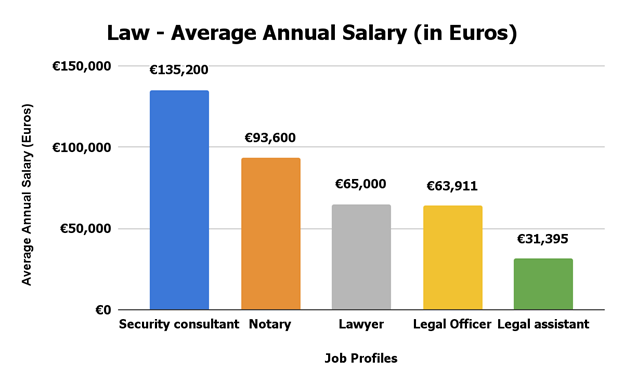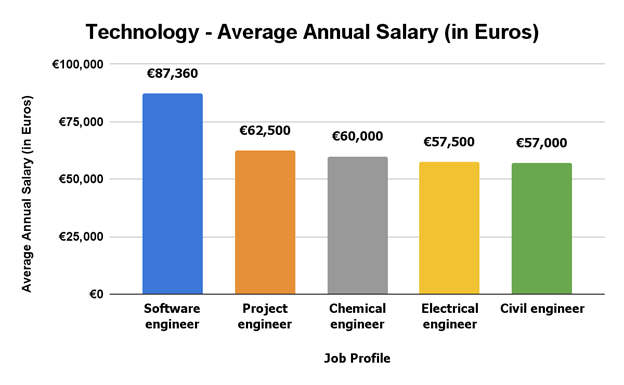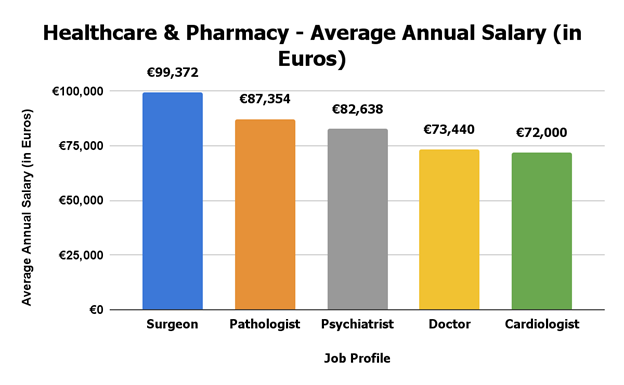Average salary in Germany in 2025 – An ultimate guide

This article covers:
- Quick read
- Do you know?
- Germany’s salary trends: Factors affecting salary in Germany
- Average salary for full-time workers in Germany: (€4,567 per month & €54,800 per year)
- Average salary for part-time workers in Germany: (€2,874 per month & €34,485 per year)
- Average salary in Germany: Citywise
- Highest paying jobs in Germany
- Lowest paying jobs in Germany
- Salary for experience
- Difference between median & average (mean) salary
- Before you go…
- FAQs
Germany is known for its strong economy and robust industrial base, making it a key player in the European Union (EU). It offers an excellent quality of life and houses influential organisations for you to level up your career and secure your financial future.
A crucial aspect of understanding the country’s economic landscape involves exploring the average salary in Germany. Knowing the factors affecting salaries, the average income, the top-paying industries and jobs, and the median income figures can help you gauge your earning potential and make informed decisions about your career path.
Quick read
- The average salary in Germany for a full-time employee is €4,567/month, which accumulates to €54,800/year.
- The average salary in Germany for a part-time employee is €17.68/hr. The average monthly salary is €2,874, and the annual salary is €34,485.
- The top industries in Germany are:
- Banking & Finance (avg annual salary: €71,088)
- Science (avg annual salary: €65,562)
- Law (avg annual salary: €68,640)
- The leading employers of Germany include McKinsey & Company, Porsche, BMW, SAP, Audi, Siemens Healthineers, Forschungszentrum Jülich, Salesforce, etc.
Do you know?
- Germany’s employment rate is forecasted to be 61.38% in 2024. [1]
- In the IMD World Competitiveness Survey 2024, Germany achieved the 22nd rank out of an extensive coverage of 64 economies. [2]
- With an average annual income of USD 54,800, Germany secures 21st rank in terms of the highest average income in the world. [3]
- As of January 1, 2024, Germany’s Minimum Wage Commission raised the minimum standard to €12.41 per hour. [4]
Germany’s salary trends: Factors affecting salary in Germany
As mentioned earlier, the average salary in Germany is €54,800 per year. But what you earn can vary depending on several factors, as discussed below.
- Industry – A job in one of the country’s leading industries, like technology, banking & finance, and science, can help you earn a higher salary. Usually, when the sector is thriving, the salaries match the growth.
- Level of Education – Education plays an important role in how much you can earn. Many high-paying jobs require a high level of education. A master’s degree-level professional will earn much more than those with a bachelor’s degree.
- Work Experience – After the effect on salary by education level, the number of years of experience you have also influences your salary. Your salary keeps increasing as your experience increases.
- Job roles and responsibilities – Salary is also influenced by job roles and responsibilities. Specialised jobs like cardiologists, pilots, legal notaries, construction reviewers, etc., command higher salaries.
- Location – The basic salary in Germany also varies by location. Cities like Mannheim, Essen, and Frankfurt offer better salaries than others.
- Company position – A company making higher profits will be in a better position to provide salaries than its peers. The size, reputation, and background of the company also matter.
- Government regulations – Government authorities often lay down rules and regulations concerning labour laws, the minimum average wage in Germany, etc. These impact the salary directly.
- Global competitiveness – The global landscape has an impact on Germany’s labour market. It can affect rates of employment, inflation, interest, etc. Thus, you must also consider these economic factors affecting salaries.
Also Read: How to get a job in Germany from India
Average salary for full-time workers in Germany: (€4,567 per month & €54,800 per year)
Germany is Europe’s largest and the world’s fifth-biggest economy, offering a variety of career opportunities. It attracts many skilled and qualified workers in different fields and disciplines. If you want to explore career options in Germany, improve your salary negotiations, or understand the earning possibilities in this growing economy, you must know Germany’s average income per month and year in different sectors.
The table below highlights the leading industries and the average salary data in Germany for full-time employees.
Top Industries | Average Annual Salary (in EUR) |
Banking & Finance | €71,088 |
Law | €68,640 |
Science | €65,562 |
Technology | €51,934 |
Healthcare & Pharmacy | €55,139 |
Source: Talent
Let’s take a look at some of the top job profiles in each of these industries:
Banking & Finance: Avg Salary -€71,088 per year

Source: Talent
Law: Avg Salary -€68,640 per year

Source: Talent
Science: Avg Salary -€65,562 per year

Source: Talent
Technology: Avg Salary -€51,934 per year

Source: Talent
Healthcare & Pharmacy: Avg Salary -€55,139 per year

Source: Talent
The other industries offering high-paying jobs include information technology, education, marketing, prosecution (legal), management & business, insurance, and military.
Average salary for part-time workers in Germany: (€2,874 per month & €34,485 per year)
Pursuing a part-time job is vital for most international students in Germany as it enables them to have a smooth stay in the country. Moreover, it expands their social network and understanding of the work culture.
Before applying for a part-time job, you must understand the essential regulations, as their non-compliance can lead to deportation from the country. You can work for 120 full or 240 half work days each year. During this period, you cannot undertake freelancing assignments or self-employment.
Furthermore, to draw a part-time job salary in Germany, you require special permission from the Federal Employment Agency. The table below mentions the average per-hour salary in Germany for different types of part-time jobs.
Type of Job | Average Pay per Hour (in EUR) |
Student Assistant | €12.80 to €17.60 |
Tutor | €16 to €26.67 |
Courier Delivery | €13.73 to €53.33 |
Waiter/Waitress | €13.87 to €53.33 |
Office Assistant | €14.46 to €46.92 |
Also read: 10 Highest paying part-time jobs for students in Germany 2024
Some other popular types of part-time jobs with a satisfactory per-hour salary in Germany include:
- Library supervisor
- Literature researcher
- Trade fairs
- Babysitter
- Shopping assistant
- Cashier
Average salary in Germany: Citywise
The salary you earn in Germany can vary depending on the work location. Since the cost of living fluctuates from city to city, salary is likewise impacted. The table below explores the provincial salary variations in Germany.
City | Average Annual Salary (in EUR) |
Mannheim | €53,230 |
Essen | €53,138 |
Frankfurt | €56,237 |
Nuremberg | €54,756 |
Munich | €58,745 |
Source: Salary Expert
Also Read: How to study for free in Germany
Highest paying jobs in Germany
To earn a higher salary in Germany, you need to work in leadership and management roles in top companies and industries. Moreover, you are likely to earn a higher salary if you complete a specialisation in fields like healthcare, law, marketing, accounting, etc.
The following table lists Germany’s top 10 highest-paying jobs based on average annual salary.
Job title | Industry | Average Annual Salary (in EUR) |
Medical Advisor | Pharmaceutical | €70,000 – €110,625 |
Doctor | Healthcare | €66,000 – €142,200 |
Pilot | Aviation | €27,600 – €160,900 |
Lawyer | Law | €38,000 – €146,000 |
Management Consultant | Management & Business | €40,200 – €141,700 |
Software Architect | Technology | €58,100 – €123,700 |
Portfolio Manager | Banking & Finance | €46,300 – €137,800 |
Program Project Manager | Management & Business | €53,800 – €132,500 |
Legal Counsel | Law | €50,600 – €123,800 |
Service Delivery Manager | Shipping & Logistics | €47,200 – €130,600 |
Lowest paying jobs in Germany
All jobs in Germany don’t offer a high salary. Like any other country, some jobs are well paid while others aren’t.
If your skillset and educational qualification don’t match, you may have to compromise with entry-level and service-sector jobs. The common opportunities include social worker, linguist, hairdresser, waitress, historian, cleaner, cashier, etc.
Check out the following table to learn about the lowest-paying jobs in Germany.
Job Types | Industry | Average Annual Salary (in EUR) |
Cleaner | Construction & Maintenance | €29,064 |
Ticket Agent | Hospitality | €24,960 |
Cashier | Banking & Finance | €29,120 |
Packer | Shipping & Logistics | €27,456 |
Data Typist | Accounting, Administration & Human Resources | €26,910 |
Source: Talent
Also Read: Navigating the cost of living for expats in Germany
Salary for experience
Most employers in Germany, like other countries of the world, prefer hiring professionals with relevant work experience. This trend is noticeable in the pay scale in Germany, as people with more experience earn more than fresh graduates or relatively new professionals.
The table below gives Germany’s salary comparison based on years of experience.
Years of Work Experience (in years) | Average Salary Per Year (in EUR) |
0 – 1 (freshly graduates or interns) | €31,147 |
1 – 2 | €32,143 |
2 – 4 | €35,040 |
4 – 8 | €42,012 |
8 – 12 | €49,165 |
12 – 16 | €57,948 |
16 – 20 | €66,460 |
20+ | €68,361 |
Source: Average Salary Survey
Difference between median & average (mean) salary
There are two ways to calculate the average salary in Germany – the mean method and the median method. While they both are mentioned interchangeably, understanding the difference between the two is crucial to grow in your career.
Let’s calculate the average (mean) and median salary considering the following scenario.
Person 1 | €1,500 |
Person 2 | €2,500 |
Person 3 | €4,500 |
Person 4 | €7,500 |
Person 5 | €12,000 |
The mean method focuses on adding the salaries of all persons and dividing the total by the number of persons.
In this example, the calculation will be as follows:
Average (mean) salary = (1500 + 2500 + 4500 + 7500 + 12000) / 5 = €5,600
For estimating the median salary, the figures must be arranged in ascending order, from lowest to highest. The salary falling in the middle of the order is the median.
In the above example, €4,500 is the median income. With this method, you can understand that 50% of the population earns below €4,500 and 50% earns higher. Germany’s average income is €45,900 yearly, and Germany’s median income is €48,490 yearly.
The median and average (mean) salary help determine if you are being paid fairly compared to the overall population.
- You are doing well if you earn more than the average and median income.
- You must focus on improving your skills if your salary is below average and median salary.
- If your salary is between the average and the median, you need to evaluate the performance of your specific industry and the professionals with work experience equal to yours.
Before you go…
Germany offers a vast range of industries and opportunities to help individuals advance their careers. Understanding the average income in Germany in different fields is essential to gauge how financially stable you can be and how you can plan your financial growth. A full-time professional can earn an income of €3,830 per month. This amount is sufficient to maintain a standard of living since the country’s cost of living is low.
Moreover, Germany’s Minimum Wage Commission is active and strives to protect employees. Thus, in 2024, it has increased the limit for the minimum average wage in Germany, making it €12.41 per hour.
So, get your CV ready, sign up on an online job portal, and search for a job matching your requirements. Once you begin earning a basic salary in Germany, you may consider sending money home. It’s recommended to utilise a secure and verified platform such as Instarem for all your international transactions. This platform is renowned for providing rapid, cost-effective, and secure transaction methods.
Instarem gives you the convenience of transferring money online from Europe with no hidden charges and multiple rewards on every transaction.

*rates are for display purposes only.
Try Instarem for your next transfer.
Download the app or sign up here.
FAQs
What is the current average salary in Germany?
According to figures posted by Salary Expert, the average salary in Germany for 2025 is €4,334 per month and €52,013 per year.
What is a good salary in Germany?
The term ‘good’ can have varied meanings for different individuals. Germany’s median income is €48,490 per year. Earning higher than this median income is considered good, as you are amongst the high-earning population of the country.
Which job has the highest salary in Germany?
The highest-paying salaries in Germany vary from city to city. In general, medical advisors, doctors, lawyers, pilots, portfolio managers, software architects, etc., demand higher salaries.
Which job has the lowest salary in Germany?
There are many service-related jobs with a low salary in Germany. These jobs include receptionists, cleaners, backers, waitresses, dental assistants, salespersons, editors, architects, graphic designers, etc.
What is the average salary in Germany for IT?
The average income in Germany for IT professionals is estimated to range between €48,750 and €85,800 annually, depending on the role and skills.
What is the average salary in Germany per month for an Indian?
The average salary in Germany per month for an Indian depends on the job industry, role, education level, work experience, location, etc. Typically, it can range anywhere between €960 and €17,000.
How do you find a job in Germany?
There are many online job portals and recruitment agencies to find jobs in Germany. Get your CV ready and register yourself on such platforms to find a job suited to your educational qualifications and financial goals.
Disclaimers:
- This article is intended for informational purposes only. All details are accurate at the time of publishing. Instarem has no affiliation or relationship with the products or vendors mentioned.
- * Fast meaning 75% of our transactions are completed in 15 minutes. Depending on the funding method.
- #When it comes to affordable exchange rates and fees, it’s worth noting that the cost will vary depending on how you choose to fund your Digital transactions. Credit card funding and bank transfer fees can differ significantly.
Other related blogs:
- Australia – Average Salary in Australia
- USA – Average Salary in USA
- Canada – Average Salary in Canada
- UK – Average Salary in UK
Citations























